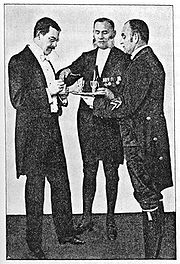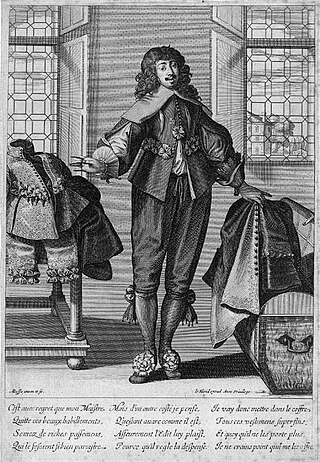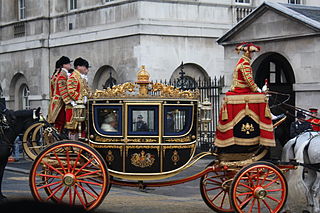
A lackey or lacquey, in its original definition (attested 1529, according to the Oxford English Dictionary ), is a uniformed manservant.
Contents
The modern connotation of "servile follower" appeared later, in 1588 (OED). [1]

A lackey or lacquey, in its original definition (attested 1529, according to the Oxford English Dictionary ), is a uniformed manservant.
The modern connotation of "servile follower" appeared later, in 1588 (OED). [1]
There are several theories about the origins of the word. By one theory, it is derived from Medieval French laquais, "foot soldier, footman, servant", ultimately from Turkish ulak, literally "a messenger". [1] The word also exists in German, where Lakai denotes a liveried manservant in the services of a monarch or prince.
Lackey is typically used as a derogatory term for a servant with little or no self-respect who belittles himself in order to gain an advantage. [2] Such advantage is often assumed to be slight, temporary and often illusory.
A honeymoon is a holiday taken by newlyweds after their wedding to celebrate their marriage. Today, honeymoons are often celebrated in destinations considered exotic or romantic. In a similar context, it may also refer to the phase in a couple's relationship – whether they are in matrimony or not – that exists before getting used to everyday life together.
A meme is an idea, behavior, or style that spreads by means of imitation from person to person within a culture and often carries symbolic meaning representing a particular phenomenon or theme. A meme acts as a unit for carrying cultural ideas, symbols, or practices, that can be transmitted from one mind to another through writing, speech, gestures, rituals, or other imitable phenomena with a mimicked theme. Supporters of the concept regard memes as cultural analogues to genes in that they self-replicate, mutate, and respond to selective pressures. In popular language, a meme may refer to an Internet meme, typically an image, that is remixed, copied, and circulated in a shared cultural experience online.
P, or p, is the sixteenth letter of the Latin alphabet, used in the modern English alphabet, the alphabets of other western European languages and others worldwide. Its name in English is pee, plural pees.
The symbol # is known variously in English-speaking regions as the number sign, hash, or pound sign. The symbol has historically been used for a wide range of purposes including the designation of an ordinal number and as a ligatured abbreviation for pounds avoirdupois – having been derived from the now-rare ℔.

Extortion is the practice of obtaining benefit through coercion. In most jurisdictions it is likely to constitute a criminal offence; the bulk of this article deals with such cases. Robbery is the simplest and most common form of extortion, although making unfounded threats in order to obtain an unfair business advantage is also a form of extortion.

Cowardice is a trait wherein excessive fear prevents an individual from taking a risk or facing danger. It is the opposite of courage. As a label, "cowardice" indicates a failure of character in the face of a challenge. One who succumbs to cowardice is known as a coward.

A barque, barc, or bark is a type of sailing vessel with three or more masts and mainmasts rigged square and only the mizzen rigged fore and aft. Sometimes, the mizzen is only partly fore-and-aft rigged, bearing a square-rigged sail above.
Gringo (masculine) or gringa (feminine) is a term in Spanish and Portuguese for a foreigner, usually an English-speaking Anglo-American. There are differences in meaning depending on region and country. In Latin America, it is generally used to refer to non-Latin Americans. The term is often considered a pejorative, but is not always used to insult, and in the United States its usage and offensiveness is disputed.
Empirical evidence for a proposition is evidence, i.e. what supports or counters this proposition, that is constituted by or accessible to sense experience or experimental procedure. Empirical evidence is of central importance to the sciences and plays a role in various other fields, like epistemology and law.

Zyzzyva is a genus of South American weevils, often found on or near palm trees. It was first described in 1922 by Thomas Lincoln Casey, Jr., based on specimens obtained in Brazil by Herbert Huntingdon Smith.

A steno machine, stenotype machine, shorthand machine, stenograph or steno writer is a specialized chorded keyboard or typewriter used by stenographers for shorthand use. In order to pass the United States Registered Professional Reporter test, a trained court reporter or closed captioner must write speeds of approximately 180, 200, and 225 words per minute (wpm) at very high accuracy in the categories of literary, jury charge, and testimony, respectively. Some stenographers can reach 300 words per minute. The website of the California Official Court Reporters Association (COCRA) gives the official record for American English as 375 wpm.

A valet or varlet is a male servant who serves as personal attendant to his employer. In the Middle Ages and Ancien Régime, valet de chambre was a role for junior courtiers and specialists such as artists in a royal court, but the term "valet" by itself most often refers to a normal servant responsible for the clothes and personal belongings of an employer, and making minor arrangements. In the United States, the term most often refers to a parking valet, and the role is often confused with a butler.

A groom or stable boy is a person who is responsible for some or all aspects of the management of horses and/or the care of the stables themselves. The term most often refers to a person who is the employee of a stable owner, but an owner of a horse may perform the duties of a groom, particularly if the owner only possesses a few horses.

A domestic worker or domestic servant is a person who works within the scope of a residence. The term "domestic service" applies to the equivalent occupational category. In traditional English contexts, such a person was said to be "in service". Domestic workers perform a variety of household services for an individual, from providing cleaning and household maintenance, or cooking, laundry and ironing, or care for children and elderly dependents, and other household errands.

A butler is a person who works in a house serving and is a domestic worker in a large household. In great houses, the household is sometimes divided into departments with the butler in charge of the dining room, wine cellar, and pantry. Some also have charge of the entire parlour floor and housekeepers caring for the entire house and its appearance. A butler is usually male and in charge of male servants while a housekeeper is usually a woman and in charge of female servants. Traditionally, male servants were better paid and of higher status than female servants. The butler, as the senior male servant, has the highest servant status. He can also sometimes function as a chauffeur.

A footman is a male domestic worker employed mainly to wait at table or attend a coach or carriage.

An eggcorn is the alteration of a phrase through the mishearing or reinterpretation of one or more of its elements, creating a new phrase having a different meaning from the original but which still makes sense and is plausible when used in the same context. The word "eggcorn" is itself an eggcorn, derived from acorn. Eggcorns often arise as people attempt to make sense of a stock phrase that uses a term unfamiliar to them, as for example replacing "Alzheimer's disease" with "old-timers' disease", or Shakespeare's "to the manner born" with "to the manor born".
The word asshole or arsehole, is a vulgarism used to describe the anus, and often used pejoratively to refer to people.
In physics, a quantum is the minimum amount of any physical entity involved in an interaction. The fundamental notion that a physical property can be "quantized" is referred to as "the hypothesis of quantization". This means that the magnitude of the physical property can take on only discrete values consisting of integer multiples of one quantum.
A pejorative word or phrase, slur, or derogatory term is a word or grammatical form expressing a negative or a disrespectful connotation, a low opinion, or a lack of respect toward someone or something. It is also used to express criticism, hostility, or disregard. Sometimes, a term is regarded as pejorative in some social or ethnic groups but not in others or may be originally pejorative but later adopt a non-pejorative sense in some or all contexts.